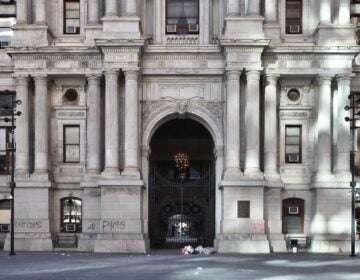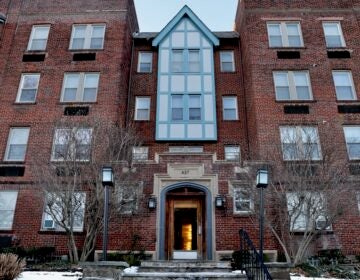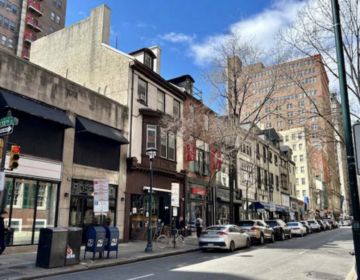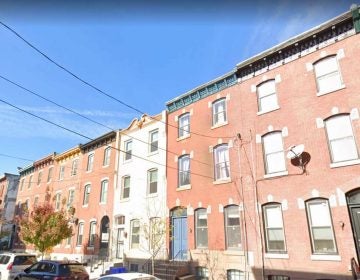Sigma Studios, birthplace of the Philly Sound, wins spot on city’s historic register
The Philadelphia Historical Commission voted unanimously to add Sigma Studios to the local Register of Historic Places.
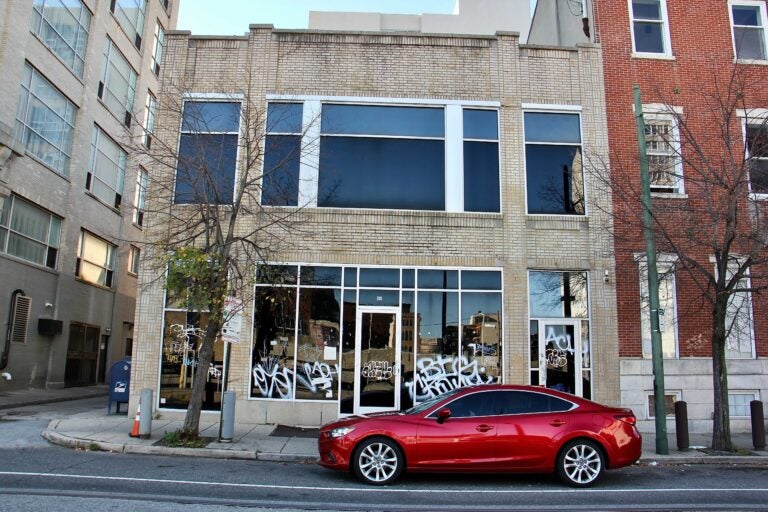
Sigma Sound building, 212 N 12th St. (Emma Lee/WHYY)
The Sigma Studios building — birthplace of the famous “Philly Sound” — has won a spot on the Philadelphia Register of Historic Places, protecting the beloved cultural landmark from demolition.
The Philadelphia Historical Commission voted unanimously on Friday to designate the former recording studio at 210-212 N. 12th Street. The birthplace of Philadelphia International Records — founded by Kenney Gamble, Leon Huff, and Thom Bell — the diminutive brick building carries a legacy of more than 200 gold and platinum records. Huge names recorded there including Stevie Wonder, Gladys Knight, and David Bowie. The Preservation Alliance for Greater Philadelphia, along with partners from Breweytown Beats and the nonprofit Philly Sound Archive, nominated the building for inclusion in the register.
Tayyib Smith, an entrepreneur who has recently set his sights on revitalizing 52nd Street’s Black business corridor, said he sees the designation as the first step to acknowledging Black Philadelphians’ contributions to music.

“One of the reasons we don’t have museums or cultural spaces, like Nashville or Memphis, that can speak to that history is we have more than 100 years of anti-Blackness that exists within our tourism and hospitality institutions,” Smith said.
The designation means that the building’s owner cannot tear down or significantly alter the structure without proving a special hardship and obtaining permission from the city’s Historical Commission.
Lawyer Nino Tinari, who represented the building’s owner at Friday’s hearing, said his client is willing to explore options for developing the site within the rules of the designation. According to permits filed with the city in 2018, the developer had planned to remake the site into a 10-story building with 26 dwellings and a roof deck.
“That would have to be revised,” Tinari said.
The Historical Commission does not have jurisdiction over zoning approval and it does not preclude future uses or redevelopment.
Tinari said his client doesn’t yet have designs for the site, but the owner is working on one that would work within the preservation rules.
“This is an especially important project to my client,” the lawyer told the Commission. “They are attempting to see what can be done to accommodate your condition. At the same time, we’re committed to developing this particular site.”
Owner wants to build condos; others want a museum
The former studio sits in one of the city’s fastest-gentrifying areas, surrounded by formerly industrial buildings brought back to life as sleek residences. Many people who spoke at Friday’s hearing said they don’t want the building’s envelope preserved for luxury dwellings that don’t reflect the history made there.
For them, preservation is the first step for a bigger mission: creating a museum. Ideally, it would showcase Philadelphia’s impact on music over the last century. Musicians recorded at Sigma for decades before the studio closed in 2003.
The formal nomination document recognizes Sigma Sound Studios as one of the most influential 20th-century recording studios in the country.
Marc Byers, the general manager of Motown Records, implored city leaders to invest in the site.
“The world has looked at Philadelphia’s phenomenon when it comes to music for decades,” he said. “There really needs to be an honest understanding with the city and the amount of revenue that’s being left at the table by not recognizing the decades upon decades of American Black music.”
Located only a block from the Philadelphia Convention Center near Chinatown and other attractions, the building could easily fit into tourists’ itineraries, Byers and others said.
Jim Gallagher, a former ten-year Sigma employee and adjunct professor of music technology at Rowan University, argued that Sigma marks the last of a generation of musical landmarks. Other properties like Virtue Studios and Cameo Parkway, both also used by Philadelphia International Records have already been lost to redevelopment. Meanwhile, developer Carl Dranoff is now redeveloping the former Philadelphia International Records headquarters on South Broad Street into the ultra-luxury Arthaus condo tower.
“This is the last one standing to represent that era,” Gallagher said.

Subscribe to PlanPhilly
WHYY is your source for fact-based, in-depth journalism and information. As a nonprofit organization, we rely on financial support from readers like you. Please give today.



